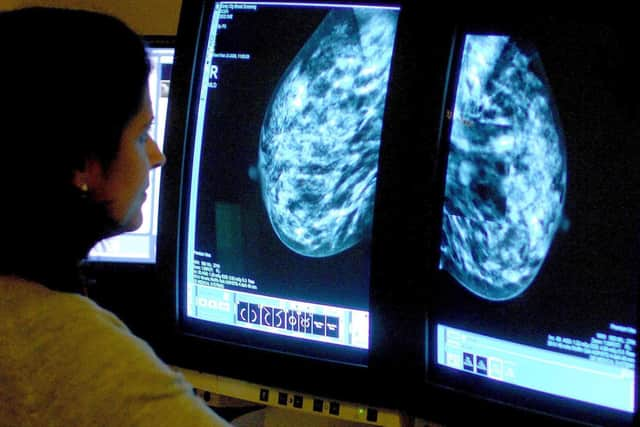Radiotherapy ‘does not improve breast cancer survival after 30 years’, study shows
Researchers found radiotherapy with either chemotherapy or the hormone drug tamoxifen after surgery does reduce the risk of the disease returning in the subsequent ten years. But it makes little difference to that risk thereafter, researchers said.
Nor does it improve overall survival after 30 years, according to the new study, which is being presented to the European Breast Cancer Conference in Spain.
Advertisement
Hide AdAdvertisement
Hide AdBut other academics point out the women included in the study initially had treatment three decades ago, and since then more sophisticated radiotherapy treatment techniques have been developed.


The new research, led by Ian Kunkler, honorary professor of clinical oncology at the University of Edinburgh, is one of the longest follow-up studies tracking patients who received breast conserving surgery.
The Scottish breast conservation trial tracked 585 patients for 30 years. All of the patients were under the age of 70 at the start of the study and they were all diagnosed with early breast cancer.
After surgery they were given chemotherapy or the drug tamoxifen – depending on whether or not their cancer was driven by the hormone oestrogen. Half of the patients also had radiotherapy.
A decade after initial treatment, the risk of breast cancer recurring in the same breast was reduced by more than 60 per cent among the group who had received radiotherapy compared to those who did not. But after the ten-year mark, the risk of recurrence was similar in both groups.
Meanwhile, 30 years after their treatment, 24 per cent of women who had radiotherapy were still alive compared to 27.5 per cent of those who did not.
“Long-term follow-up is essential in breast cancer trials so that we can understand the full picture,” Prof Kunkler said.
“These data challenge the idea that radiotherapy improves long-term survival by preventing recurrences of cancer in the same breast.”
Advertisement
Hide AdAdvertisement
Hide AdHe added: “We found that there is no long-term improvement in overall survival for those women having radiotherapy. This may be because, although radiotherapy may help to prevent some breast cancer deaths, it may also cause a few more deaths, particularly a long time after the radiotherapy, from other causes such as heart and blood vessel diseases.
“The benefits of having radiotherapy in terms of fewer local recurrences are only accrued over the first ten years after radiotherapy. Thereafter, the rate of local recurrence is similar whether or not patients had radiotherapy.
“Patients with breast cancer can live for decades after treatment for the disease.
“These findings warrant comparison with other studies of similar design through long-term, careful follow-up.”
Prof Kunkler added: “It’s important to note that every woman with breast cancer is different and will have different forms of the disease.”
Comments
Want to join the conversation? Please or to comment on this article.